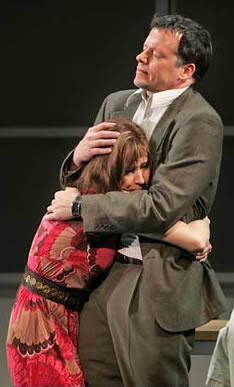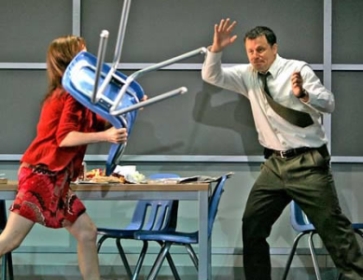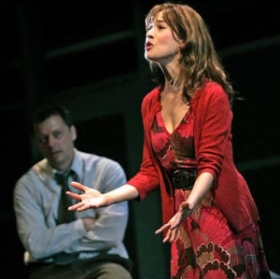Review: 'Blackbird' is a Provocative Duet of Damage
(c) San Francisco Chronicle
May 4, 2007
By Robert Hurwitt, Chronicle Theater Critic
Shocking subject matter may partly explain why "Blackbird" was a sensation at London's West End last year (receiving the Olivier Award for best play) and is attracting similar attention in the New York run that opened recently off-Broadway. But there's much more to the play that opened Wednesday for its West Coast premiere at ACT. In a dense and, for the most part, tense and provocative 80 minutes, Harrower explores not just the particulars of two intriguing characters' shared past, but issues as troubling and touchy as pubescent sexuality and what constitutes pedophilia. Steven Culp (now best known for "Desperate Housewives") and ACT newcomer Jessi Campbell inhabit the characters with riveting intensity and an at times unsettling intimacy. Loretta Greco stages the fraught showdown between strangers who were once inappropriately familiar with a combination of emotional sensitivity and surgical precision. Harrower's script has its overly schematic or theatrically contrived moments, but ACT's "Blackbird" mostly manages to soar above them. It should be mentioned that this "Blackbird" is not quite the same as the one running in New York. The Manhattan Theatre Club version has been slightly de-Anglicized with the removal of certain English references that have been retained here. It's also different from the version first seen in London, which had an added, strangely melodramatic ending. The ACT "Blackbird" probably adheres more closely to Harrower's original intent.
It's a dramatic duet, but Campbell and Culp are not the only actors onstage. An appealing Portia Juliette (alternating in the role with Hannah Rose Kornfeld) puts in a brief appearance. Shadowy figures, co-workers of Culp's Peter, pass by the elongated frosted glass windows of Robert Brill's warehouse lunchroom set, pausing to listen in ominous reminders of the forbidden nature of the secrets being disclosed. A long sliver of stark white-lit (by Russell H. Champa) space beneath a vast black void, the food-packaging-littered lunchroom combines the clinical anonymity of an operating room with the messy detritus of private lives in a public space. The site is Peter's workplace, where Campbell's Una has unexpectedly arrived to confront the man she knew as Ray, the neighbor who sexually molested her 15 years earlier, when she was 12. Ray, who's reinvented himself as Peter after serving his sentence, has apparently managed to achieve a fairly normal, workaday life. Culp's nervous defensiveness telegraphs how important that normalcy is to him and how he is psychically scarred by his imprisonment, while his curt, pained, evasive and confessional reactions to Una betray the guilt and lingering attraction he feels for her.
Much of the tension in its unraveling depends on uncertainties that neither Harrower nor Greco have fully developed. Culp's expertly conflicted Peter is too likable and believable to give us much reason to question whether he might be a pedophile, as we should, instead of a weak man who made a terrible mistake. With so much riding on Una and Peter's separate interpretations of the past, Harrower gives them memories that fit together with the unnatural neatness of a jigsaw puzzle, rather than the messy contradictions of recollected life. He's also thrown in an emotional release scene that plays like a gratuitous theatrical device. But he's written a play that confronts important, intractable issues of sexual morality in an era when heightened legislative protectiveness is in constant conflict with sex-saturated media images and a worrisome decrease in the age of physical maturation. The scars and fissures in Una's character leave no doubt that Peter's actions 15 years ago were deeply harmful. But Harrower also gives us reason to question whether more harm was caused by the responses of law enforcement, therapy and the community as well. He's also succeeded in embodying his ideas in vital, complicated human beings. In Campbell and Culp's magnetic performances, his "Blackbird" flies pretty high. Blackbird: Drama. By David Harrower. Directed by Loretta Greco. (Through May 27. American Conservatory Theater, 415 Geary St., San Francisco. 80 minutes. Tickets $17.50-$81.50. Call (415) 749-2228 or visit act-sf.org.) |
DISCLAIMER: This site is a Steven Culp fan site and is not affiliated with Steven Culp, his family or any of his representatives.
Unless otherwise noted, all captures were made by me from videos from various sources. All shows and photos belong to their respective owners.
NO COPYRIGHT INFRINGEMENT INTENDED!
© 2004-2022 SConTV.com and Steven-Culp.com
Unless otherwise noted, all captures were made by me from videos from various sources. All shows and photos belong to their respective owners.
NO COPYRIGHT INFRINGEMENT INTENDED!
© 2004-2022 SConTV.com and Steven-Culp.com


